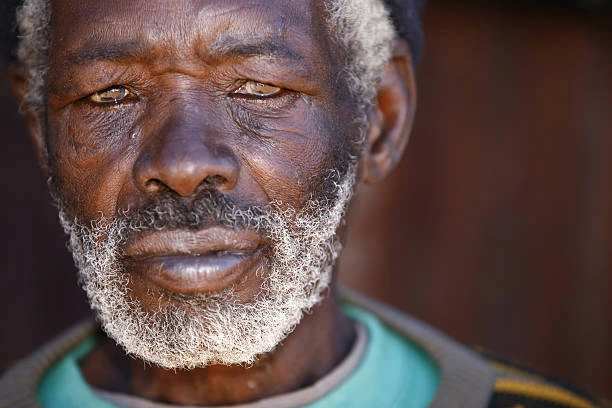Author's details
- Dr. Khashau Eleburuike
- MBBS (Ilorin) MSc. Global Health Karolinska Institute.
- Resident doctor in family medicine in Northern Sweden.
Reviewer's details
- Dr Abdulgafar Lekan Olawumi
- MBBS, MHE, MPH, FWACP, FMCFM
- Department of Family Medicine and Geriatric Centre of Aminu Kano Teaching Hospital Kano, Nigeria.

- Date Published: 2026-01-03
- Date Updated: 2025-04-19
Mental Health in Older Adults in Sub-Saharan Africa
Key Messages
- Mental health is as important as physical health for older adults.
- Common conditions in the elderly include depression, dementia, anxiety, grief, and PTSD.
- Stigma, lack of services, and low awareness make mental health care challenging in Sub-Saharan Africa.
- Families and communities play a vital role in supporting elders’ mental wellness.
- Mental illness is not a curse or weakness; it is treatable, and older adults deserve care and respect
Introduction
What is Mental Health?
Mental health means the emotional, psychological, and social well-being of a person. Good mental health allows older people to:
- Enjoy life
- Cope with challenges
- Stay connected to family and community
- Make decisions and stay independent
Mental health is just as important as physical health, especially as we age.
Discussion
Common Mental Health Conditions in the Elderly
In Sub-Saharan Africa, older people may face unique mental health challenges, including:
- Depression
- Feelings of sadness, hopelessness, or loss of interest in daily life
- May appear as tiredness, poor appetite, or body pains
- Dementia (including Alzheimer’s disease)
- Memory loss
- Confusion about time or place
- Difficulty with everyday tasks
- Anxiety
- Constant worry or fear
- May lead to poor sleep, restlessness, or fast heartbeat
- Grief and Loneliness
- Loss of a spouse, friends, or family
- Isolation due to illness or disability
- Post-traumatic stress disorder (PTSD)
- Intrusive memories or flashbacks
- Emotional or physical distress when reminded of the trauma
Mental Health Challenges in Sub-Saharan Africa
- Stigma: Mental illness is often misunderstood or seen as spiritual
- Lack of services: Few mental health professionals or facilities
- Low awareness: Symptoms are often seen as part of “normal ageing”
- Poverty and displacement can increase emotional stressLimited Integration of mental health into Primary Care services.
Warning Signs to Watch For
- Withdraws from family or social life
- Talks about feeling worthless or hopeless
- Unusual forgetfulness or confusion
- Changes in appetite or sleep
- Becomes irritable, aggressive, or very quiet
- Talks about death or wanting to die
- Unintended weight loss, weakness or lack of energy.
What Can Be Done?
At Home:
- Spend time talking and listening to elderly relatives
- Encourage regular routines (eating, walking, socializing)
- Support involvement in community or religious activities
- Reduce stress and avoid shouting or neglect
At Clinics:
- Ask about mood, sleep, and thoughts at checkups
- Use simple screening tools (e.g., Geriatric Depression Scale)
- Refer to trained mental health workers if needed
- Treat any underlying medical problems (e.g., stroke, pain, infections)
Supporting Mental Wellness in Older Adults
- Encourage exercise, even light walking
- Maintain a nutritious diet
- Create safe and respectful living environments
- Offer spiritual or community support
- Ensure access to basic care and medications.
How Families and Communities Can Help
- Speak kindly and avoid blaming or shaming
- Visit regularly—even short visits matter
- Include elders in family decisions
- Encourage them to share their stories and knowledge
- Help them get to clinics or hospitals when needed
Mental illness is not a curse or weakness. It is a health condition that can be treated. Older adults deserve care, love, and respect for their emotional well-being.
Conclusion
Mental illness is not a curse or weakness. It is a health condition that can be treated. Older adults deserve care, love, and respect for their emotional well-being.
References
- World Health Organization. (2017). Mental Health of Older Adults. https://www.who.int
- Gureje, O., et al. (2015). The profile and impact of probable dementia in a sub-Saharan African community: results from the Ibadan study of ageing. Psychological Medicine, 45(10), 2161–2170.
- WHO Africa. (2021). Mental Health in Africa: Challenges and Opportunities. https://www.afro.who.int
- Prince, M. et al. (2007). No health without mental health. The Lancet, 370(9590), 859–877.
- HelpAge International. (2019). Older people and mental health in Africa: Policy Brief. https://www.helpage.org
